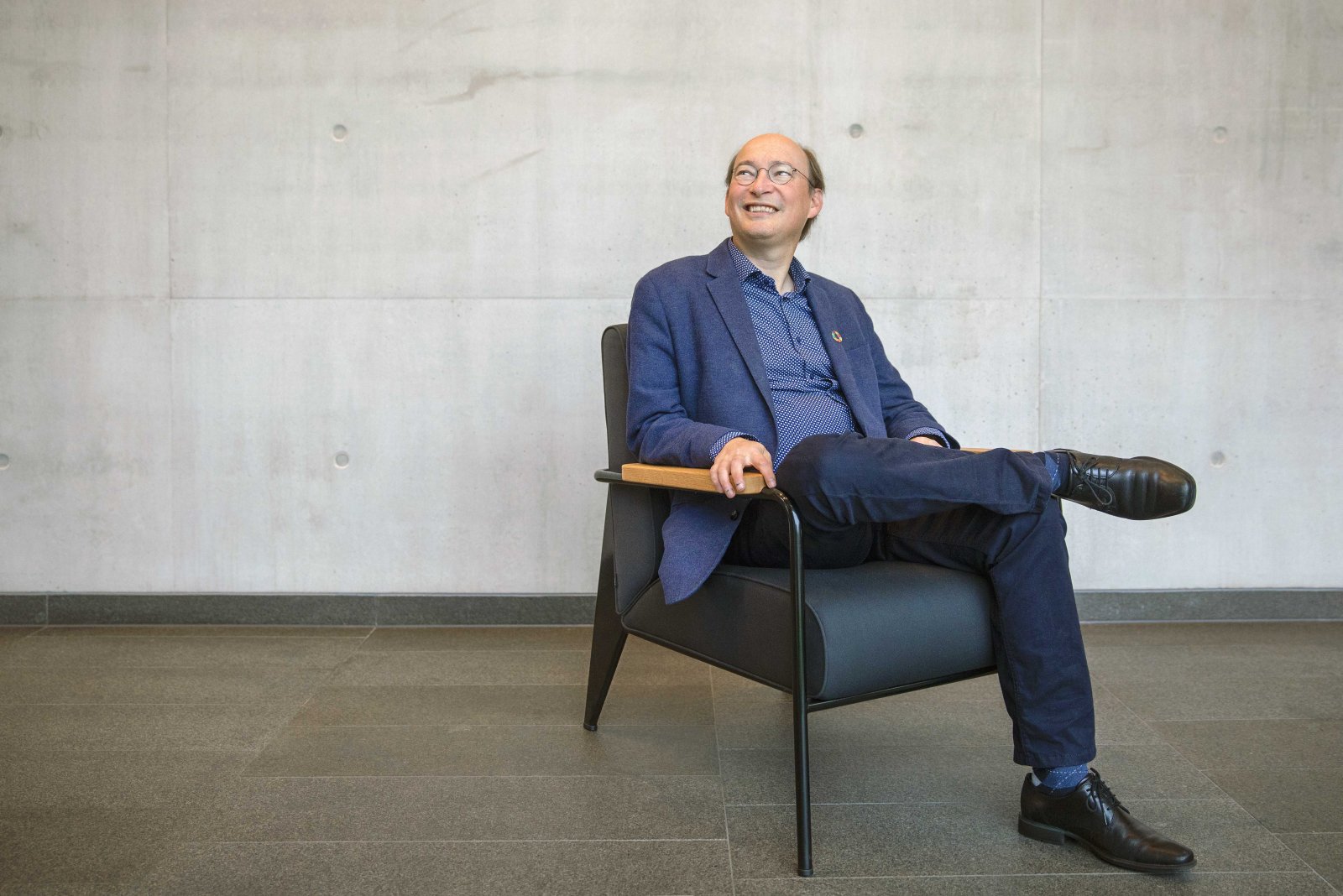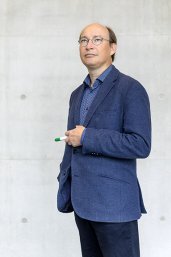The Green Model
Global climate scenarios
While his other employer just happens to be running the calculations on The Paris Climate Agreement, Professor Detlef van Vuuren gives us a behind-the-scenes look at research on global climate scenarios. How is scientific research contributing to such drastic and complex policy?

What do you think of the Climate Act?
I think it could be really important. The task currently facing us is an onerous one: we need to completely reorganise the entire energy system. That means a major commitment across a long period. There is little point in moving in one direction for four years, only for the next government to do something else for four years. I also believe strongly in sending a message, which is what happened with the Paris Agreement. Although the agreements are worldwide, and are actually quite abstract and not binding in a legal sense, they do send a message to society, that we are taking this seriously and that our long-term plan is to start moving in a particular direction. The effect is palpable. Financial institutions, for example, have started to question whether it is still sensible to invest in oil or coal companies.
How did the research at the PBL Netherlands Environmental Assessment Agency and Utrecht University influence the Paris Agreement?
Our work consists of using models to explore which types of measures are consistent with certain climate-change objectives. In effect, we produce maps, of a sort. Suppose you want to get somewhere — we try to show you what the landscape would look like, which routes are available and roughly what you will encounter along the way.
We need to completely reorganise the entire energy system
If you were to do relatively little about climate change, how would things develop? How would population, emissions, land use, their interrelationships, global geopolitical relations, develop? Subject to certain assumptions of course — what path would that world take? We also do it the other way around: if you have certain objectives to attain, what would the most attractive strategies be?
We know that genuine prediction as such is not possible, and especially not for periods of thirty or seventy years, which are the timespans we are always dealing with. Even looking only five years ahead, we sometimes encounter huge surprises. However, that doesn’t mean that all approaches are valid. There are certain things we do know, and we try to use that knowledge to make sensible decisions.
Ten years ago, most projections were aimed at limiting global warming to 2.5 degrees, but then the policymakers began putting increased emphasis on the 2-degree model. The team that I lead at the PBL was the first to look at which detailed scenarios could conceivably reach this goal. After that, the IPCC [Intergovernmental Panel on Climate Change, ed.] said: this is the standard scenario for the 2-degree objective.

In this way, via the IPCC, we helped to bring about the Paris Climate Change Agreement. To scientists, the IPCC represents the most important means of supporting climate negotiations. It is an excellent medium, a joint attempt by scientists and policymakers to establish what we know, and where there are still gaps in our knowledge.
What are the various roles of the PBL and Utrecht University?
The PBL owns the model, and has obligations regarding its application. Some of the model development occurs at Utrecht University. The collaboration is very attractive to our staff, as we now have around five young people working at the PBL who completed their PhDs at UU. PhD candidates and researchers all generally work on part of the model at some stage. One PhD candidate, Oreane Edelenbosch, recently spent most of her time working on the transport model, for example.
She worked on alternatives to air travel, correct?
She mainly looked at vehicle transport, but you’re right, air travel is one of the biggest challenges right now. We currently do not know how CO2-neutral air travel could work, despite the fact that the airline sector is one of the fastest growing sectors in terms of CO2-emissions. Possible solutions involve either biofuels — and the challenge of trying to make them sustainable from another perspective as well, or via new technologies, such as electric planes — or flying more efficiently, or less.
The latter seems almost taboo. KLM itself has said: if we stop growing, the growth will just shift somewhere else.
Indeed. Therefore, that approach would demand a much wider framework. Air traffic is at the very least regional, but legislation has made it global. A return trip to New York costs a ton of CO2, which is roughly equivalent to the maximum annual emissions allowance per person that is in line with the Paris objective by 2050. This means that one trip to New York will use up your entire yearly emissions budget, even though you still have other emissions to consider, such as driving a car or eating meat. We also use the model to try to compare options that we currently consider feasible, and it lets us look at behavioural change.
I downplay my opinion on the necessity of climate policy as much as possible
Do you also involve the humanities?
Yes, we have just started doing that. PhD candidate Nicole van den Berg is going to start looking at lifestyle. We have also engaged other researchers from her project who view things through a more social lens. To date, the most important thing we have shown is that lifestyle actually does make a difference. What we want now is to work with those in the humanities to examine how such change could be implemented, at what rate and how to differentiate between richer and poorer countries. Over the next few years, I hope to work with Nicole to interpret the results in order to give users various approaches: how big is the emissions margin, how does flying fit in, how much will reducing domestic electricity consumption help?
What are your future plans for the IMAGE model?

We will examine the relationship between climate policy and other sustainability objectives, such as the Sustainable Development Goals, in far greater detail. Under these goals, countries have promised each other that, by 2030, modern energy will be available to all, world hunger will be eliminated, the environment will be protected and we will be tackling climate change. But how? How can we put the limited amount of land and CO2 wiggle-room to good use? Our aim is to examine how models can be used to support these types of discussions.
What do you think is the role of universities and researchers in this process? Do they merely supply data, or is it more than that?
They can do more. The most important thing is to remain transparent. Researchers are a part of society, but in order to retain credibility in discussions, they must also be viewed as neutral partners. In my lectures, I try to talk to students about the different hats we put on, both as data suppliers and as active members of society. When discussing topics that are clearly unstable and full of value judgements, it is important to either admit at the outset that you come to the table with a certain value system in place from which you operate, or to try to abandon any and all values before you start. Of course, the latter is quite tricky.
Often, the problem is that the complexity of science makes it hard to explain, and makes it very easy for sceptics to say: ‘My opinion is different and is just as valid as that of Mr Van Vuuren.’
Correct. That means I downplay my opinion on the necessity of climate policy (which I am, of course, in favour of) as much as possible. Otherwise, I lose credibility in the discussion with others who take a more sceptical view. That means that I must constantly ask myself: where do I bring my value system into play and how can I stop that from happening? I always try to follow the IPCC mantra: be relevant to policy, but not prescriptive. All researchers must be careful when merging their roles as proponents of certain ideas on the one hand, and as knowledge brokers on the other. This applies even more so to me, because I work at the Assessment Authority.’

